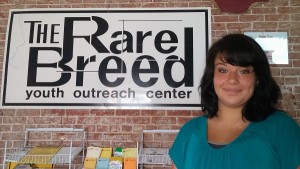
Call it a nearly picture-perfect scene: Sun rays piercing through a window pane of a downtown renovated brick building, with a 19-year-old woman talking about her dreams.
That is, of giving back in life. Of going to college. Of becoming a therapist for children. Of helping state services so that, one day, she can help those who are now walking in her shoes.
Kaia Friend was once an at-risk youth. Now she’s a high school graduate and about to graduate from The Kitchen, Inc.’s Rare Breed Youth Services Program, a key place in the Ozarks for at-risk and homeless teens.
“They’ve helped me in so many ways,” Friend said. “I finally graduated high school with their support. They’ve given me so many life skills that I don’t want to leave when I have to leave.”
Certainly, Rare Breed’s significance in the Ozarks cannot be over-stated enough, which is why the Price Cutter Charity Championship presented by Dr Pepper is proud to have The Kitchen, Inc. non-profit on board again this year.
The annual PGA’s Web.com Tour stop in Springfield has generated $12 million for local children’s charities in its history, including a record $1 million-plus last year alone. And here’s your chance to help Kaia and many other kids who rely on Rare Breed.
SUPPORTING THE PCCC = SUPPORTING CHARITIES

- HELP RARE BREED: A place for at-risk and homeless teens, Rare Breed seeks financial assistance for its many programs that help steer teens to a better life. Call 417-865-6400.
- FOR GOLF FANS, WIN PRIZES: The purchase of a $25 TLC Properties Charity Sweepstakes ticket serves as a four-day tournament pass, but it’s better than that. It enters you to win daily prizes during the tournament as well as grand prizes of $10,000 and a 2015 Ford Mustang.
- TICKET REVENUE GOES WHERE: Contact the local charity of your choice, simply because they receive revenue directly from those TLC Property Charity Sweepstakes tickets marked with their names.
- BUSINESS SPONSORSHIPS: Businesses can support the PCCC through various sponsorships, such as the daily newsletter, website or through several events such as a dozen Pro-Ams. Additionally, restaurants, clothing stores and entertainment stops and such are asked to donate a gift card with at least a $25 value in the name of your charity of choice to benefit them in the Golf Ball Charity Auction. Contact the PCCC staff at 417-887-3400.
- WHEN, WHERE: The tournament is Aug. 7-17 at Highland Springs Country Club, with the pros playing beginning Aug. 13.
About The Kitchen, Inc’s Rare Breed Youth Services
To listen to Kaia explain Rare Breed, it’s easy to become optimistic about The Kitchen, Inc.’s continued good work. You see, Kaia is due to give birth in a few short weeks. She’ll be a single mother. But she isn’t about to put her dreams aside.
She’s been saving money, for one thing, which is a requirement of Rare Breed of its teens.
“The biggest thing was finishing high school,” Kaia said. “This generation now, high school is not a big deal now. But it was when I reached out to Rare Breed and said, ‘I need help.’”
The Kitchen, Inc.’s Rare Breed Youth Services opened its doors in the year 2000 as a way to assist homeless teens too young to access adult services but too old for state youth services. The non-profit’s teens range in age from 13 to 20.
The drop-in center downtown at 301 N. Main Street offers a kitchen and hang-out area, as well as a computer lab, bathing and laundry facilities and a nursey.
What’s still needed across the city are shelter beds for teens. Only 39 are in Springfield, and yet the most recent survey, The High Risk and Homeless Youth Survey, found that 58 percent of more than 360 teens were homeless. Those include kids who don’t have permanent homes and “couch-serf” or stay with relatives, said Loni Brewer, Coordinator of Rare Breed.
PCCC dollars help Rare Breed teens in a variety of ways but particularly toward the salary of a child care worker, whose value is enormous. The worker often educates an at-risk teen who is functionally illiterate and may not know how to read to their siblings or own children.
Additionally, teens are required to find employment in which they must save 20 percent for savings and put 20 percent toward housing.
“We run a very tight ship and our child care worker doesn’t get paid much,” Brewer said, and later added, “Every little bit helps. … It’s incredible how many kids we can help with such a tight budget. And our volunteers are tremendous. Our volunteers’ goal is to teach the kids to be self-sustaining.”
Rare Breed’s transitional program is significant.
As Brewer described the non-profit, “It’s not a handout. It’s a hand up.”